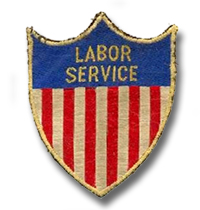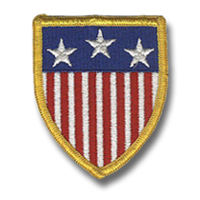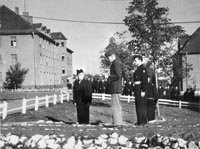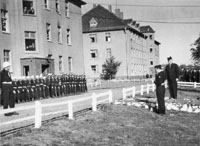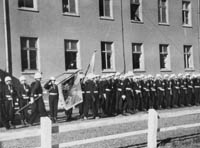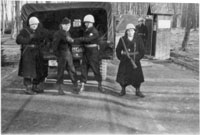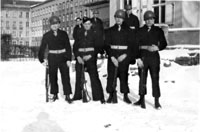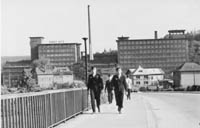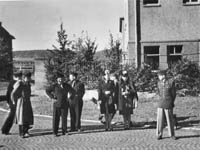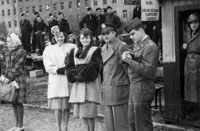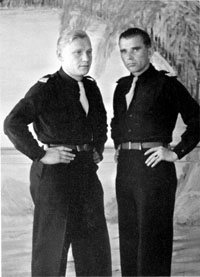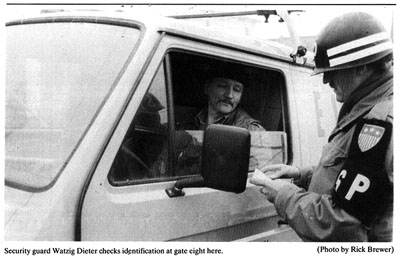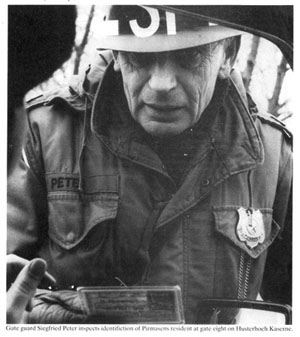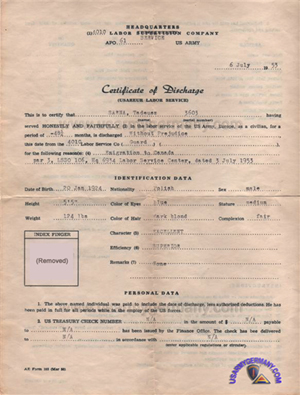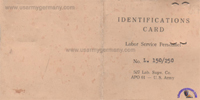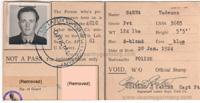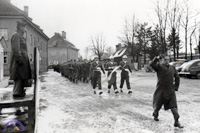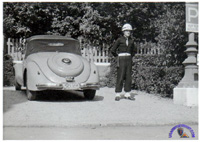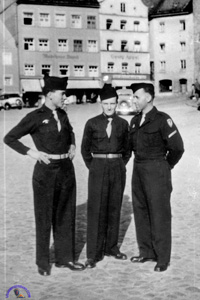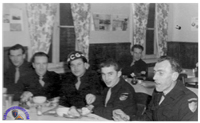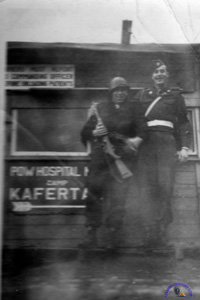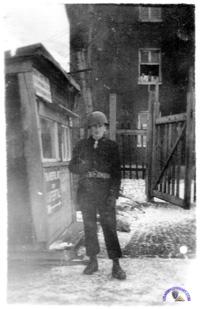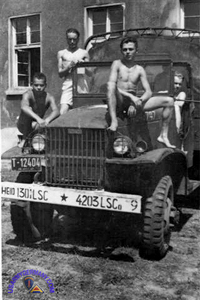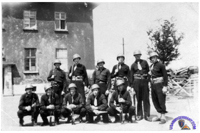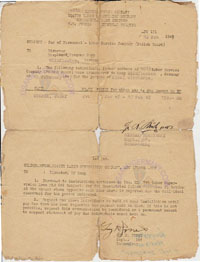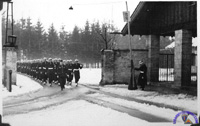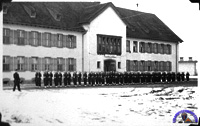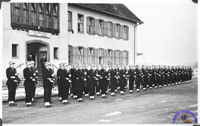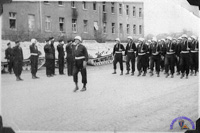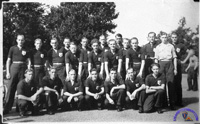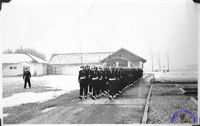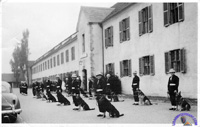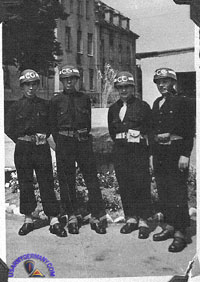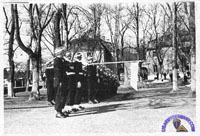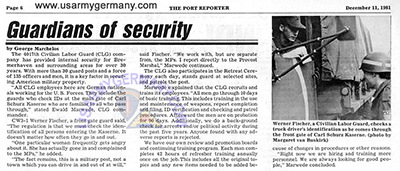| If you do
NOT see the Table of Contents frame to the left of this page, then
Click here to open 'USArmyGermany' frameset |
||||||||||||||||||||||||||||||
|
Labor Service Division |
||||||||||||||||||||||||||||||
|
|
||||||||||||||||||||||||||||||
|
||||||||||||||||||||||||||||||
|
|
||||||||||||||||||||||||||||||
| 4006th Labor Service Co (Guard) | ||||||||||||||||||||||||||||||
| 4104th Civilian Support Gp (Guard) | ||||||||||||||||||||||||||||||
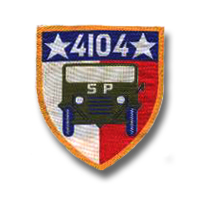 4104th Civilian Support Group (Guard) Patch (courtesy
Siegbert Mann)
4104th Civilian Support Group (Guard) Patch (courtesy
Siegbert Mann) |
||||||||||||||||||||||||||||||
| (Source: COMMUNITY TIMES, Feb 1, 1984) | ||||||||||||||||||||||||||||||
| CSG Gate Guards:
Protecting those who protect Germany By Rick Brewer For the men of the 4104th Civilian Support Group (Guard), the grim job of sentry duty begins here, under an early morning sun or amid heavy rain and snowfall at midnight, at kasernes bearing the names: Husterhoeh, Muenchweiler and Fischbach Army, or ammunition and equipment storage sites bearing numerical identifiers such as 5-9, 3-2 and 4-7. Unlike the 4104th sentry of decades past, however, these CSG security policemen need not salute, address their superiors as Colonel, Major or "Sir". Nor do they toil 12-, 18- or 24-hour shifts to pick up a paycheck. As before, a sentry must attend and successfully complete a rigorous training program to join the civilian support group, but now they extend professional courtesy by addressing others as simply, "Mister" or "Miss" and work no more than 10 hours a day. |
||||||||||||||||||||||||||||||
|
||||||||||||||||||||||||||||||
| Yet the new
methods of the CSG, especially those employed by the 4104th, also
raise questions: Just how well trained are these CSG guards to protect
the interests of the community? Going a step further, how much can
Americans here depend on today's less regimented sentrys? Many officials here agree that it is hard to guage the capabilities of the 4104th guard since none has been confronted with a life-threatening incident since the unit was headquartered in Pirmasens in 1953. Some of the sentrys themselves, however, share Poplonski's view that 'the guard' is less military oriented today. "When we joined we knew of the threat (from the East), what it meant for Americans to be here," said Michael Wenger, a Pole with 32 years of service. "I'm not sure that the young guys have an appreciation for what being in the CSG, especially the 4104th, actually is." Beyond question, many of today's 4104th sentrys are not overly concerned about pledging allegiance to the United States and the American military. With nearly 11 percent of the German populace currently unemployed, many are just happy to have work. |
||||||||||||||||||||||||||||||
|
||||||||||||||||||||||||||||||
| "But we're
happy here with that we now have," Pauly continued. "If we weren't
or for those who aren't, the door is open." The 4104th's turnover rate is extremely low. For example, during the last four months of 1983, the unit lost ten -- or roughly three percent -- of its members to retirement or other jobs. Admittedly, that figure may be attributed to the country's joblessness. Many of the 4104th's guards, like Emanuel, say that they keep working rather than join the ranks of Germany's unemployed. But most say they wouldn't have it any other way. The workday begins early for Gerhard Kuehner, a German who's been a member of the 4104th for almost two years. He mans his post at Gate One at about 4 a.m. Dressed in olive-drab colored fatigues, Kuehner presents an appearance one would expect from a hardened soldier. He's medium height, slender, looks to be in fairly good physical shape, short hair -- not whitewalls, but close. His view of his profession is every bit as straightforward. He sees himself, and his peers, as keeping a check on the heartbeat of democracy. Although that pulse-taking is a small part in insuring a healthy political system, it's one that's vital. "I'm not just protecting American property, I'm protecting those who are protecting Germany," he says. His two daughters, ages 14 and 15, "respect me," he adds. Older countrymen "do likewise." Helmut Kaemmerer said, "Once in a while you can smell it," referring to the threat he and his co-workers defend against. His monthly pay of DM 1200 (approximately $425) isn't much, but it is the same as that he received in a local shoe factory where he worked until two years ago. Kaemmerer has little doubt that if he were called on to use force to guard his post, he would. "I joined, I know the rules, and I work for the Americans," he explained. "I'm sure I'll do it." It's hard to "get in touch" with the 4104th guard without looking to the veterans. Many are foreign nationals -- Italians, Yugoslavs and Poles. Most have been with the 4104th more than five years. The average 4104th sentry has many qualities... qualities that are hard to see from the surface. There's lots of "gung-ho" talk and show of spirit from some, but for most, that's just not their style. The 4104th veteran of 32 years, Wenger, is typical. While admitting that he sees the 4104th guard as less well-prepared today than those of years past, Wenger rests patiently in the foyer of the unit's headquarters, waiting to start his shift. "We've got a job to do," is about all he'll say. Similiar attitudes are readily displayed by most of the guards on Wenger's shift. Gergar Victor is a native of Yugoslavia who fled his homeland in 1950 because, he says, "I wouldn't spend an ounce of my time in the communist army." He'll never be able to return home. The 4104th is his home. "I have no complaints," he says. That sense of belonging runs high in the outfit. It is fostered by many of 4104th's members who, like Victor, are refugees from other countries and keep on with the unit because they know no other life. They make the most of what they have. Others are former soldiers who want to maintain a physical, as well as emotional, tie with a military organization. Others look at their work as, simply, "a way to make a living." "If we don't do it, who else will?" asked Armo Kelsch, 18. Klaus Nerding, 34, is starting his seventh year as a member of the 4104th. "I wanted to join and I make it good" he said. Life, and work, for the average 4104th guard appears good. Although the work is often tedious and many times completed under adverse conditions, the hours, the guards say, are "not too long". That appeals to those members of the 4104th who are married. Guards who are single -- whose pay is often taxed heavily -- can live in low-cost billeting on the kaserne. Any guard can receive meals in dining facilities here. The cost: DM 8 a day. Most 4104th guards agree that if they could change anything, it'd be the amount of training they receive. CSG guards receive instruction in weapons handling, uniform wear, security procedures and law during their 14-day basic training course in Kaiserslautern.There are 42 hours of refresher training annually. They say their mission is becoming increasingly "more diverse", while their training is "not keeping up." Many are asking for more training from local military police and polizei. But officials here are quick to note that members of the 4104th do their jobs well. They point to the fact that the unit was recently recognized as being the "best CSG (Guard) Unit" in the 21st Support Command. Poplonski feels satisfied. "These people mean a lot to me," he said. "Some maybe don't like it here, or understand our mission. But, we don't have many problems. Our people are older now. Some over 50. And they do their job." Sergeant Allen Sharai is the community's physical security inspector. He says "They (members of the 4104th) are good and can to their job as long as they apply what they've learned." Major Martin Reyna, Director of Community Security, Plans, Operations and Training, says the 4104th's members are "prepared" even though "appearances may be deceiving". Still, like a soldier who has yet to see combat, the 4104th guard remains largely untested. And many officials say that while a 4104th sentry should be able to to "battle", if needed, they admit they cannot be certain of that. |
||||||||||||||||||||||||||||||
|
|
||||||||||||||||||||||||||||||
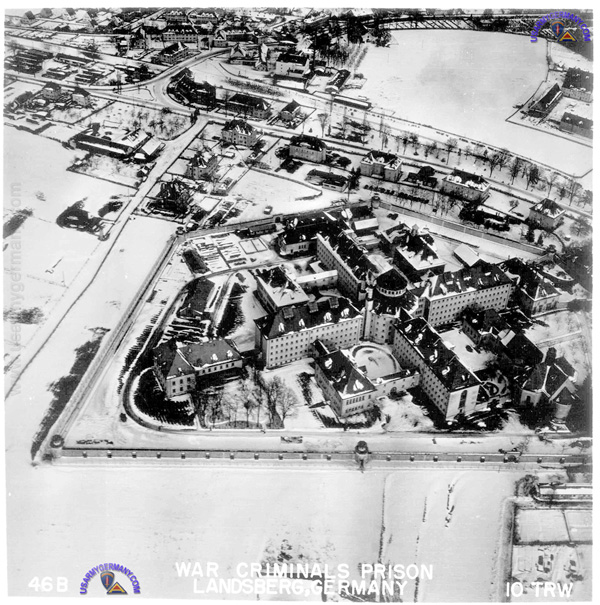 Landsberg War Crimes Prison |
||||||||||||||||||||||||||||||
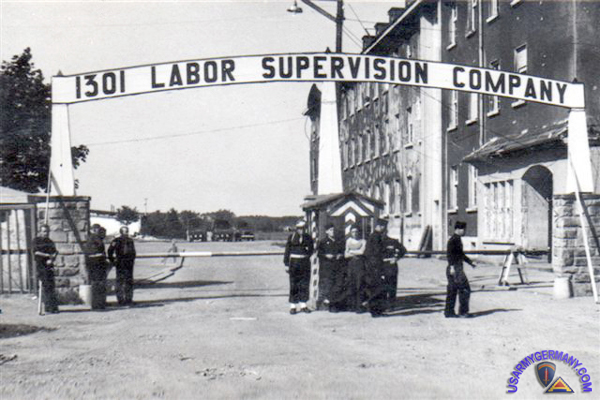 Gallwitz Kaserne (later Funari Barracks), Kaefertal (Tadeusz Sarna) |
||||||||||||||||||||||||||||||
| 4010th Labor Service Co (Polish Guard) | ||||||||||||||||||||||||||||||
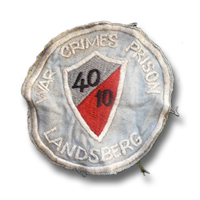 4010th Labor Service Company (Guard) Patch 4010th Labor Service Company (Guard) Patch |
||||||||||||||||||||||||||||||
| The patch above belonged to the 4010th Labor Service Company (Polish) which was tasked with guarding the Landsberg War Crimes Prison as well as the War Crime Trials (held at Dachau). The prison at Landsberg was designated the War Crimes Prison in the last quarter of 1946, to provide a central prison for the incarceration of all convicted war criminals. All war criminals sentenced to death were executed there. |
||||||||||||||||||||||||||||||
|
||||||||||||||||||||||||||||||
| (Source: Email from Michael O'Connell) | ||||||||||||||||||||||||||||||
My father in law, Tadeusz Sarna, was with the 4010th Labor Service Guard Company in Landsberg. He is 88 years old now and he has pictures of his time with the LS Guard. He then rejoined with the 4010 in Landsberg and he stayed there for approx. 4 years before he emigrated to Canada. When he was in Landsberg the Guards were billeted in houses near the Prison. He said that only 7 war criminals were hung there during his stay. Ilse Koch, a notorious woman war criminal, was there at the same time. He never witnessed any executions but only guarded prisoners and made sure they didn't harm themselves. |
||||||||||||||||||||||||||||||
|
||||||||||||||||||||||||||||||
| 4011th Civilian Support Gp (Guard) | ||||||||||||||||||||||||||||||
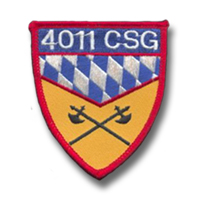 4011th Civilian Support Group (Guard) Patch
4011th Civilian Support Group (Guard) Patch |
||||||||||||||||||||||||||||||
|
|
||||||||||||||||||||||||||||||
| 4015th Labor Service Co (Polish Guard) | ||||||||||||||||||||||||||||||
| 1950 | ||||||||||||||||||||||||||||||
| (Source: Email from Henry Dolbik whose father served with the Labor Service) | ||||||||||||||||||||||||||||||
|
||||||||||||||||||||||||||||||
| 4017th Civilian Support Gp (Guard) | ||||||||||||||||||||||||||||||
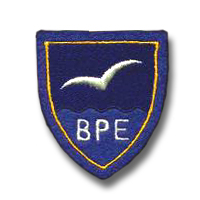 4017th Civilian Support Group (Guard) Patch
4017th Civilian Support Group (Guard) Patch |
||||||||||||||||||||||||||||||
| 1950 | ||||||||||||||||||||||||||||||
|
|
||||||||||||||||||||||||||||||
| 4222nd Civilian Support Gp (Guard) | ||||||||||||||||||||||||||||||
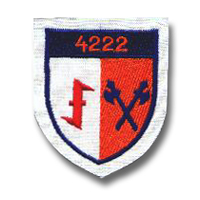 4222nd Civilian Support Group (Guard) Patch
4222nd Civilian Support Group (Guard) Patch |
||||||||||||||||||||||||||||||
|
|
||||||||||||||||||||||||||||||
| Related Links: |
||||||||||||||||||||||||||||||
